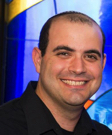YOM KIPPUR SERVICES SCHEDULE
Yom Kippur
Friday evening, September 29, Minchah/Kol Nidre/Ma-ariv, promptly at 5:30 p.m.
Shabbat morning, September 30, 9:00 a.m. (Yizkor sometime after 11:00 a.m.)
Shabbat afternoon, September 30, Minchah, 4:45 p.m.
Shabbat evening, September 30, N’ilah, 6:00 p.m.
Children’s services begin at 10:30 a.m.
Please join us for a break-fast following Ma-ariv on Motzei Shabbat, September 30.
We are different.
Much of the moaning, groaning, crying, and breast-beating typical of most synagogues’ High Holy Days services are so unnecessary —and they even run contrary to the traditions of Judaism’s earliest days. Yes, repentance is hard work, but the point of Rosh Hashanah and, especially, Yom Kippur is that we’re given the gift of time necessary to do that work, and we’re given the secret of how to succeed at it: Through t’shuvah—sincere repentance; through t’fillah—prayers for the gift of strength we’ll need to change our ways for the better; and through tz’dakah—performing actual acts that testify to the sincerity of our repentance, we will avoid the severe decree. We will emerge whole.
We can repent at any time during the year, 24/7/365. Yet we lead such busy lives filled with countless distractions that we don’t have the time we need to concentrate on our inner selves. So God carved out a special time just for that purpose—the Ten Days of Repentance.
For the first nine days, from the first day of Rosh Hashanah through Erev Yom Kippur, we get our minds attuned to the great task ahead. Then we arrive at Day 10, Yom Kippur, the day on which we’re freed from mundane concerns just long enough to take stock of our lives; just long enough to do the work needed for t’shuvah. This is not our “last chance” or our “only chance,” but merely our best chance for repentance because God gives us the gift of time to think things through and make change happen.
This isn’t something to mourn, but to celebrate with joyful song.
And, unless a particular text requires a more solemn approach, that is the approach we take to the High Holy Days liturgy, even on Yom Kippur (which technically is a festival day, as well as a day of fasting).

Our
High
Holy
Days
Cantor
GIL EZRING
Gil Ezring enters his fifth and final year of studies at the Jewish Theological Seminary's H.L. Miller Cantorial School this fall. As a Cantor, he believes his job is to create meaningful and unique connections, something that fits in perfectly with our congregation's style.
Gil uses various styles of music as his medium to build those connections between himself and congregants, congregants to each other, and the congregation to God.
Gil is a classically trained opera singer, with a degree in music education. He collaborated with Temple Israel in Charlotte, N.C., to create a rock service for Rosh HaShanah, Rock HaShanah. Building from its popularity, he continued to develop a monthly Rock HaShabbat service, and established a Jewish rock band, Rock HaRuach (now The Ruach). In his spare time, he is one half of the Jewish songwriting duo “AGEz,” composing Jewish music in various musical styles.
